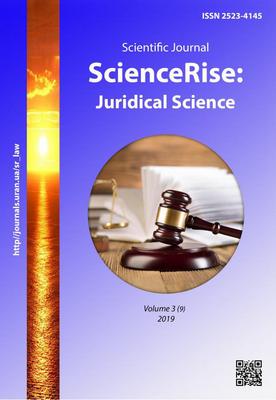Transformation of the constitutional-legal status of the prosecutor's office in Ukraine and foreign experience
DOI:
https://doi.org/10.15587/2523-4153.2019.179942Keywords:
constitution, justice, constitutional reform, prosecutor's office, constitutional status, functions, foreign experienceAbstract
The article is devoted to the analysis of the transformation of the constitutional and legal status of the prosecutor's office in independent Ukraine, from its Soviet model with broad control and supervisory powers to the prosecutor's office of a democratic, rule of law state, its place in the modern system of public authorities.
In the article, the analysis of modern reform processes in the system of the national prosecutor's office is combined with the coverage of models in the latest world constitutional and legal practice to different branches of power, and from that place the role and importance of the prosecutor's office in the system of state power. In scientific constitutionalism, there are several options for attributing a prosecutor's office to a particular branch of state power, or even defining it as a separate body of state power. The option of attribution of the prosecutor's office to the executive power system has been successfully implemented in the states making practice of the USA, Denmark, France, the Netherlands, Germany, Austria, Poland, and Sweden.
The model of including the prosecutor's office in the legislative branch has the right to life, but it has not become widespread. Contrary to this model, the prosecution's attribution to the judiciary became a reality in Spain, Bulgaria, Croatia and other countries. In the Constitution of these states, the provisions on prosecutorial authorities and the regulation of their activities are contained in the sections of the judiciary. In addition to these basic options for determining the constitutional status of the prosecutor's office, there are others that are less common.
The problem of determining the position of the prosecutor's office in the system of distribution of state power in Ukraine was one of the constant topics of discussion, on which various concepts and long-standing scientific and theoretical disputes were raised. The Revolution of Dignity in 2014 stimulated the development of the current stage of the constitutional process and the introduction of amendments to the Constitution in the area of justice, which paved the way to reform of the prosecutor's office in Ukraine. Article 131 of the Constitution of Ukraine, which regulates the constitutional and legal status of the prosecutor's office, enshrined a new normalization of the bodies of the prosecutor's office, their place in the system of public authorities. Constitutional changes resulted in the exclusion of Section 7 of the Constitution of Ukraine "Prosecutor's Office" from the Basic Law, and Article 131 took its new place in Section 8 of the Constitution of Ukraine "Justice". Further development and clarification of the constitutional and legal status of prosecutorial authorities is acquired in the Law of Ukraine "On Amendments to Certain Legislative Acts of Ukraine on Priority Measures for the Reform of the Prosecutor's Office" of September 19, 2019. The Law introduces a new structure of the prosecutor's office, clarifies the law of the Prosecutor of Ukraine, the maximum number of employees of the prosecution bodies is determined, the requirements regarding the attestation of employees of the prosecution bodies are specified
References
- Khesse, K. (1981). Osnovy konstitucionnogo prava FRG. Moscow, 234.
- Khemonteske, Sh. L. (1999). O dukhe zakonov. Moscow, 139–140.
- Potebenko, M. O. (2001). Prokuratura iak garant zakonnostі. Vіsnik prokuraturi, 6, 3.
- Skomorokha, V. (1998). Okremi pytannia podilu vlady i yurysdyktsiia Konstytutsiinoho Sudu Ukrainy. Pravo Ukrainy, 5, 8–17.
- Fedorenko, V. L. (2016). Konstytutsiine pravo Ukrainy. Kyiv, 537.
- Tatsii, V. (1999). Prokuratura v systemi podilu vlady. Visnyk prokuratury, 2, 27–28.
- Konstitucii Gosudarstv Evropy. Vol. 1 (2001). Moscow, 77.
- Shemshuchenko, Yu. S. (Ed.) (2001). Derzhavotvorennia i pravotvorennia v Ukraini: dosvid, problemy, perspektyvy. Kyiv, 257.
- Konstitucii gosudarstv Evropeiskogo Soiuza (1997). Moscow, 579.
- Pro vnesennia zmin do Konstytutsii Ukrainy (shchodo pravosuddia): Zakon Ukrainy vid 2 chervnia 2016 r. (2016). Holos Ukrainy, 118. Available at: https://zakon.rada.gov.ua/laws/show/1401-19
- Pro prokuraturu (2015). Zakon Ukrainy No. 1697-VII vid 14 zhovtnia 2014 r. Vidomosti Verkhovnoi Rady Ukrainy, 2-3, 12. Available at: https://zakon.rada.gov.ua/laws/show/1697-18
- Pro vnesennia zmin do deiakykh zakonodavchykh aktiv Ukrainy shchodo pershocherhovykh zakhodiv iz reformy orhaniv prokuratury (2019). Zakon Ukrainy No. 113-IX vid 25 veresnia 2019 r. Vidomosti Verkhovnoi Rady Ukrainy. 2019. Available at: https://zakon.rada.gov.ua/laws/show/113-20
Downloads
Published
How to Cite
Issue
Section
License
Copyright (c) 2019 Oleksandr Bilous

This work is licensed under a Creative Commons Attribution 4.0 International License.
Our journal abides by the Creative Commons CC BY copyright rights and permissions for open access journals.
Authors, who are published in this journal, agree to the following conditions:
1. The authors reserve the right to authorship of the work and pass the first publication right of this work to the journal under the terms of a Creative Commons CC BY, which allows others to freely distribute the published research with the obligatory reference to the authors of the original work and the first publication of the work in this journal.
2. The authors have the right to conclude separate supplement agreements that relate to non-exclusive work distribution in the form in which it has been published by the journal (for example, to upload the work to the online storage of the journal or publish it as part of a monograph), provided that the reference to the first publication of the work in this journal is included.









